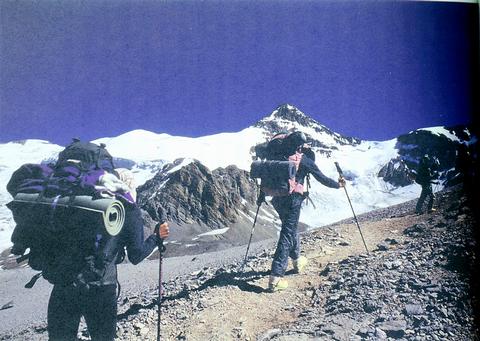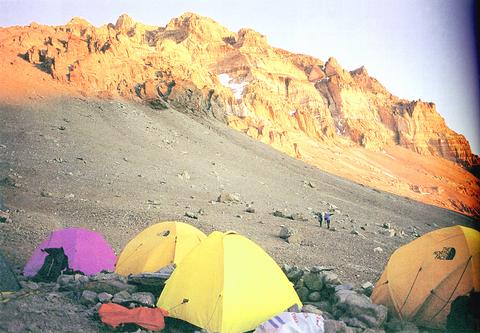Among the trendy crowd passing in and out of this downtown coffee shop, Lin Yi-hua (林乙華) and Lee Mei-liang (李美涼) are easy to spot. Casually sitting on an outdoor bench, the two young women, 27 and 30 respectively, look nothing like the sleek female shopping crowd that occupies downtown Taipei. They wear no-frills, windproof jackets, plain T-shirts and tough sports shoes -- like kids on their way to PE class.
Something about the quiet way they talk suggests a strong and long-standing friendship. It's no surprise to discover that last year they became the first Taiwanese women to reach the top of Aconcagua -- the highest mountain in South America -- and have another five expeditions together under their belt.

PHOTO COURTESY OF LEE MEI-LIAN GAND LIN YI-HUA
The account of Lin and Lee's pioneering journey can be found in The Climb to Aconcagua (南美攀登記), the recently released book they co-authored.

PHOTO COURTESY OF LEE MEI-LIANG AND LIN YI-HUA
Sitting in the coffeehouse talking, both are very unassuming. Lee decides against having a sandwich, saying it's "too expensive." Most of the money they earn, she explains, goes toward their climbing expeditions.
"If we didn't go on these expeditions, we would have saved enough money to buy a suite in Tamshui or an RV. ... to enjoy the lifestyle of single, white-collar women. ... But everyday we jog and climb cliffs and mountains. We live like the Flintstones." For Lin and Lee, life is out on the rugged trails.
The two friends met in the mountain climbing club at Minchuan College (銘傳大學). After graduating in 1997, they began planning an expedition with other club members to the Heavenly Mountains (天山) in China's Xinjiang Province. One member after another backed out of the plan, some having lost their enthusiasm and others becoming slaves to the nine-to-five grind. "At that time, Yi-hua asked me, `If no one else goes, do we still go?' I said `yes,' and since then we haven't cared that we're just two women," Lee said.
"In choosing mountaineering, you choose a lifestyle," said Lin, who now works at a magazine as a marketing specialist. She lost her previous job at Academia Sinica after an expedition in Nepal, for which she had to take a one-month leave. "Few companies allow that, so every time we came back from an expedition abroad, we became jobless," Lin said.
Lee also lost her previous job over the same expedition and is, at present, a freelance writer. They look at each other and share a smile. It's easy now to laugh at these occasional clashes between their chosen lifestyle and that of others.
Despite the run-ins with employers and the high cost of their pastime, the duo insists on joining expeditions outside Taiwan. "There's no real physical challenge in climbing mountains in Taiwan. To try out the mountaineering skills we've learned in books, we have to go on long expeditions in extreme weather," said Lin.
The Aconcagua expedition cost them NT$400,000 -- no small amount for young salary-earners. "The cycle is always like this: we go on an expedition, spend all our savings, came back to work hard for more than a year, saving all we can for our next trip," Lin said.
"A mountaineer's lifestyle entails an indifference to material things, and a resulting sense of freedom," Lin said. Lee agrees, "It makes you more flexible. Not that we belittle possessions like cars or houses, we just don't think they're necessary."
Their attitude may seem at odds with the social convention of working at a stable job to accumulate wealth -- the expectation of most Taiwanese parents. Lin's passion for mountaineering is not a problem with her family as her father shares her passion for mountain climbing.
Lee, on the other hand, had a hard time persuading her hard-working parents that mountaineering is not "fooling around," as they had insisted. "They finally realized my devotion to mountain climbing, and that it's more than just having fun to me," she said.
Lee and Lin have found the hiking lifestyle to be of great help in many ways. Although their frequent resignations don't look good on their resumes, they've been honest about their passions during job interviews.
"When I apply for a job, I try to show how serious I am about the job and how diligent I would be. That's the most important thing," Lin said."Most employees like hiring expeditioners because their stringent training has made them focused, well-organized, and unafraid of difficulty," Lee said.
On trials around the world they are often the only women from Taiwan's mountain climbing scene, though they expect that to change very soon.
"In the past, the traditional idea that mountain climbing was a man's sport discouraged many girls from joining an expedition. Their education and the social environment sent them the message that such dangerous activities weren't for them," Lee said. "But I think now more and more women are taking up extreme sports like mountaineering," Lin added. As their Heavenly Mountains experience taught them, it's not so hard for two women to go alone on expeditions. "We've had to do everything ourselves, but we pulled through the hard work," Lin said. Their example is encouraging for other female mountain climbers in Taiwan.
According to Lin and Lee, women have some qualities which are important for mountain climbing. "Women are cautious, considerate and flexible. This is a great plus. Although women do not have strong muscles to help them walk as fast as men do, their slower pace allows them to pay attention to their breathing, which is a vital part of hiking. Careful breathing helps you adjust to the high altitudes, and prepares you for the whole journey," Lee said.
"It's easy for men to forget about the importance of adjusting to the altitude because they think they are so strong and they walk so fast. ... Many accidents happen exactly because the hikers go too fast and their bodies cannot adjust to the environment," said Lin.
Lin and Lee would be the wrong source for Hollywood-style adventure stories. Despite the apparent danger of their many journeys, they would sooner break the myths about mountain climbing than conjure up Vertical Limit-style stories of their experiences.
"Many people asked us about the most thrilling experience we've had during our hiking. But it's not like that for mountain climbers. Once you set out on an expedition, you enter a state where you concentrate on being careful with each step. You are focused on the moment," said Lin.
They've recently, and quite literally, set their goals higher. After conquering Aconcagua's 6,962m height, they will likely challenge Mount Everest -- after saving the money to do so. "It's a life-long accumulation; once you get this high, you only want to try to get higher," Lin said.
However, their insistence on summiting ever higher mountains has little to do with a desire to conquer the world's highest peak. "Each time we plan an expedition to a higher mountain, we spend more time preparing physically and mentally for it. We do more research and try to learn more about the environment," Lin said. "We're not getting a kick out of conquering harder and harder targets. It's more about the discipline and the preparation for the expedition. In these things, we learn more than in the expedition itself," Lee said.

Next week, candidates will officially register to run for chair of the Chinese Nationalist Party (KMT). By the end of Friday, we will know who has registered for the Oct. 18 election. The number of declared candidates has been fluctuating daily. Some candidates registering may be disqualified, so the final list may be in flux for weeks. The list of likely candidates ranges from deep blue to deeper blue to deepest blue, bordering on red (pro-Chinese Communist Party, CCP). Unless current Chairman Eric Chu (朱立倫) can be convinced to run for re-election, the party looks likely to shift towards more hardline

Last week the story of the giant illegal crater dug in Kaohsiung’s Meinong District (美濃) emerged into the public consciousness. The site was used for sand and gravel extraction, and then filled with construction waste. Locals referred to it sardonically as the “Meinong Grand Canyon,” according to media reports, because it was 2 hectares in length and 10 meters deep. The land involved included both state-owned and local farm land. Local media said that the site had generated NT$300 million in profits, against fines of a few million and the loss of some excavators. OFFICIAL CORRUPTION? The site had been seized

Sept. 15 to Sept. 21 A Bhutanese princess caught at Taoyuan Airport with 22 rhino horns — worth about NT$31 million today — might have been just another curious front-page story. But the Sept. 17, 1993 incident came at a sensitive moment. Taiwan, dubbed “Die-wan” by the British conservationist group Environmental Investigation Agency (EIA), was under international fire for being a major hub for rhino horn. Just 10 days earlier, US secretary of the interior Bruce Babbitt had recommended sanctions against Taiwan for its “failure to end its participation in rhinoceros horn trade.” Even though Taiwan had restricted imports since 1985 and enacted

Enter the Dragon 13 will bring Taiwan’s first taste of Dirty Boxing Sunday at Taipei Gymnasium, one highlight of a mixed-rules card blending new formats with traditional MMA. The undercard starts at 10:30am, with the main card beginning at 4pm. Tickets are NT$1,200. Dirty Boxing is a US-born ruleset popularized by fighters Mike Perry and Jon Jones as an alternative to boxing. The format has gained traction overseas, with its inaugural championship streamed free to millions on YouTube, Facebook and Instagram. Taiwan’s version allows punches and elbows with clinch striking, but bans kicks, knees and takedowns. The rules are stricter than the